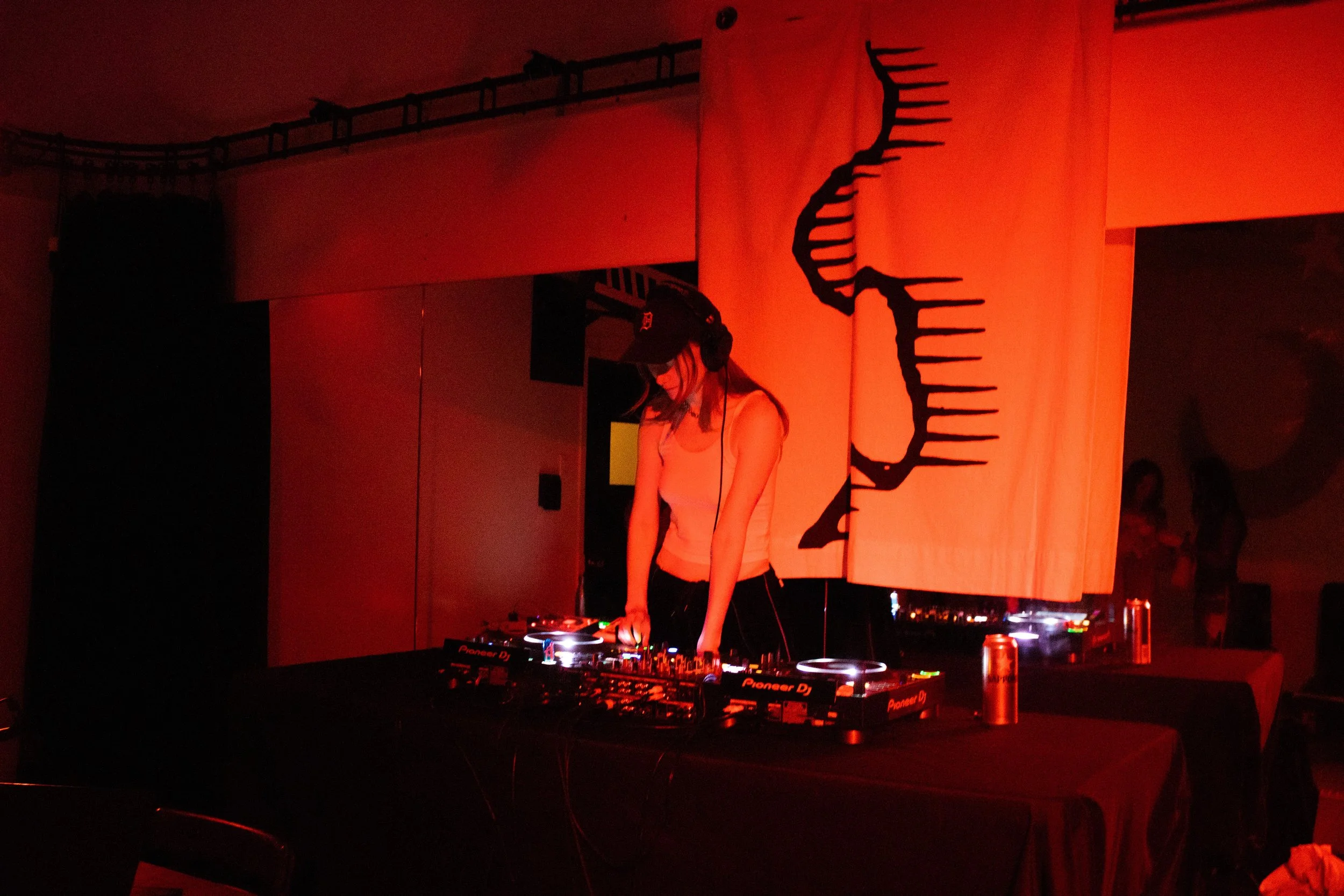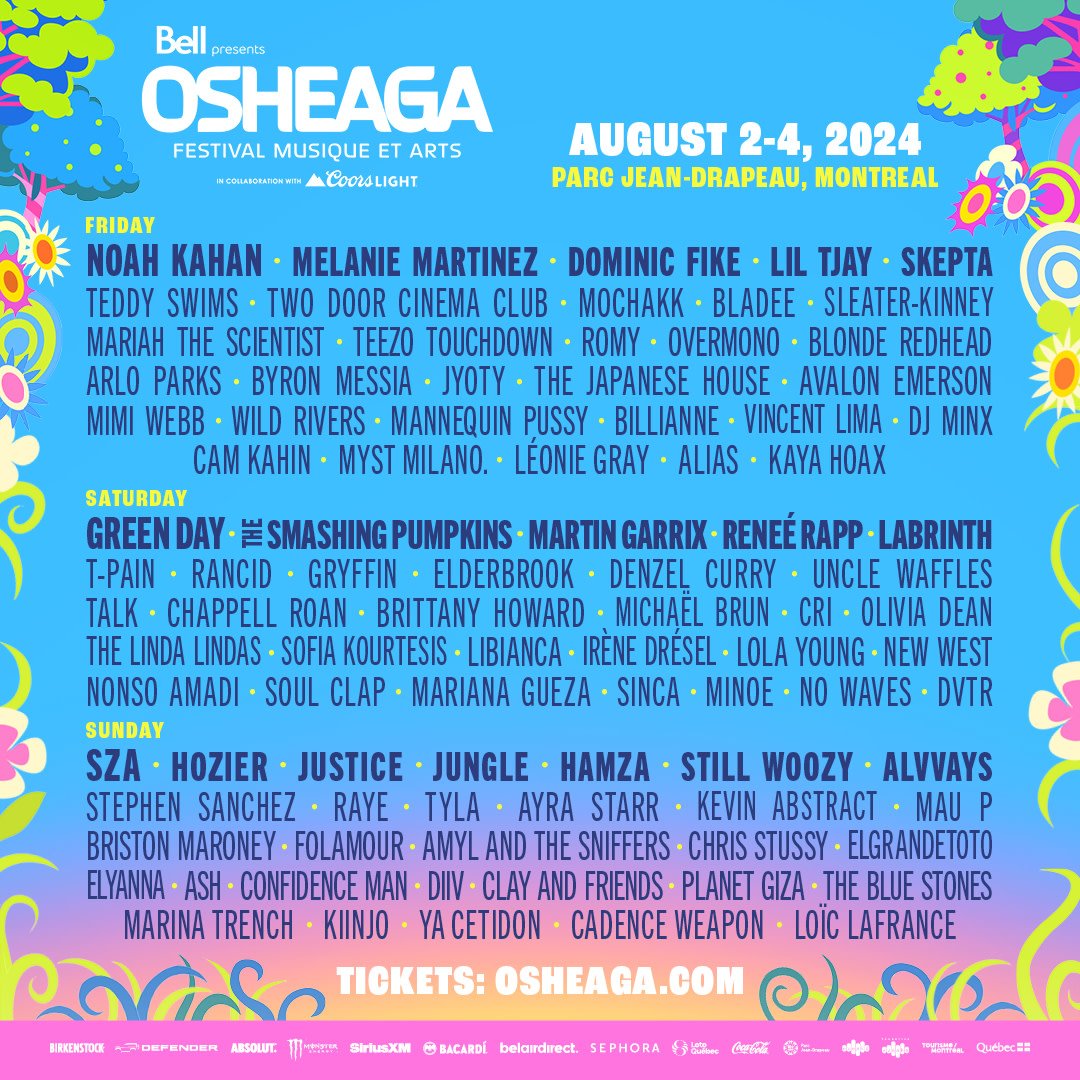Interzone’s "Transcendental Cuisine" Marks an Exciting Comeback in the Electronic Scene
via Interzone
Translations of interviews in this article were done by its author.
The Transcending Experience of "Transcendental Cuisine"
After entering through a door located near the lively intersection of St. Laurent and St. Joseph, the participants descended a few short steps before arriving at the basement venue of La Sotterenea. They were greeted at the door for tickets in a small hallway lined with two doors that made up the space: the chill room on the right and the noise room on the left.
The April 29th show, titled "Transcendental Cuisine," was Interzone's first show back since the start of the pandemic – and it was remarkable. The show, which began at 8PM and finished at 3AM, featured six local artist sets ranging from live noise to techno and electro DJ sets. Throughout the night, you could go between listening to Kore, Wormhole of Doubt, Stan K, Nixtrove, Myfanwy, Neo Edo, and Matthew Raymond, and spending time in the chill room across the hallway where a bar, pool table, comfy sofas, warm light, and a merch table could be found.
The show hosted somewhere between 100-120 attendees, and both rooms were filled throughout the night. I spoke with several of the participants, organizers, and artists at the event to hear their thoughts on both the show itself and the broader collective.
Playing for Interzone
I spoke with Jessy Myfanwy, who played her first-ever official DJ set at the Interzone show. As she explained, she had often played with her friends, but this was her first time having a curated set.
Jessy became involved in the electronic music scene in Vancouver at 18, attending underground disco and tropical house shows. She then oriented herself towards more experimental, "hard and weird" genres five years ago.
When I asked Jessy if she had any specific musical intentions in her mixing. She explained that she liked to play "Very chaotic mixes that still have some sort of accessibility to the general population."
"I really like playing electro remixes of bangers and a lot of industrial music. [I'm] getting a bit more into techno now. I've always been really into industrial music and industrial kinds of techno. I want to experiment with genres like opera… I'm really into contemporary opera."
Jessy loved her experience playing her first show at Interzone. "They did such an excellent job organizing it," she explained. "I love when there's a mix of live sets and DJing.
[It was] my first time being to Sotterenea since before the pandemic, and I forgot how much I loved the space. Having a chill room is really important, outside of the music, because it gives space. You can be involved in different layers of participation which I really like."
Along with the space's disposition, Jessy was happy with the turnout, which she described as a "mixed crowd" of participants coming from different scenes.
Who is Interzone – What is Interzone?
With no fixed origin, Interzone emerged out of inspirations tracing back to the European industrial scene and Tunisian upbringings. I got the chance to speak with Ghazi Bena, one of the co-creators of the collective, who described the collective – active since 2018 – as being a product of the kind of musical and artistic drives he and co-creator Habib Bardi experienced prior to their arrival in Montreal.
Interzone also grew out of a desire to break out of the increasingly commodified rave and electronic music scene of Europe, explained Ghazi. The European electronic scene had, at that point, reached a kind of "saturation," a nearly "unreachability in which you could no longer do anything innocent and pure," he said. "It was like a structure already made, too deep-seated, too commodified."
Upon arriving in Montreal, Ghazi and Habib grew to appreciate the "kinds of territories which weren't devoured by the 'business' side we now see in the scene."
Fluid, in movement, spontaneous, explosive, absolute chaos – Interzone seeks to embody a space in which artistic expression may emerge without being submitted to the rigidity of capitalism. The very structure – or perhaps, lack thereof – of the collective illustrates its philosophical underpinnings.
One of Interzone's significant motives is, as described by Ghazi, a kind of "effective urgency," an urgency to "organize, to create that kind of space, that space of existence." He wanted to clarify that this motive did not stem merely from the organizers. "The core of the artistic drive does not come from us; it comes from the artists' performances [who] are doing incredible things. It's the people who attend and who have a particular interest in music and performance in general…it is those who make art and music live."
The organizers were pleased with the event, agreeing that it was their most successful one. "The party was a great pleasure, [to get to] see this energy which emanates from the people and the artists…to see that people are still excited, still here."
Ghazi noted the fun they had organizing and experiencing the event, which is crucial to what they seek to create. Although they maintain some level of artistic exigency, they seek to minimize the 'seriousness' of their collective. "There is some form of seriousness to have, but at the same time…[we aim to] not transform the serious aspect into something hermeneutic and opaque which does not accept difference.
We had so much fun…it is something which makes us live, not materially speaking…but in an existential sense."
Playing with Interzone
I also spoke with Willliam Humphrey, who describes himself as "a filmmaker and an editor" who likes "helping out wherever needed."
William attended the event and has been involved with Interzone for several years. He described the fluid structure of Interzone: "There's this ability for everyone to take a small role or even just be present." For William, the event reinvigorated a sense of excitement regarding the artistic scene after two years of pandemic-ridden slumber.
With the impressive number of new collectives emerging into the scene, I asked William what he thought made Interzone unique. "I think what makes each one unique is their sensibility," he explained, "They're willing to take risks and incorporate local musicians with international musicians."
One example he cited was an event they organized in 2019 when they invited the England-based Giant Swan to play at a loft rave. William explained that the collective thought to themselves, "Giant Swan has never played in Montreal. Let's book them. Let's get them from the U.K. to Montreal and have them play a show with a ton of great local acts."
"It's not an easy one to do," he continued. "Financially, it's hell. But it's the exhibitions and events that they host that are so worth it."
William is equally excited for what's to come – parties, shows, and events all summer in the hot Montreal weather. As these things come back to life, I wanted to know what William would like to see change or happen in the electronic scene. "More windows [and] air circulation," he noted. "But I think more than anything, utilizing the outdoors as a space to hold events, whether it be on the mountain or in the bushes or maybe off the islands."
Photo by Eva Miette Giard
Interzone, the Scene, and What's to Come
As pandemic restrictions diminish and the Montreal artistic and electronic music scene comes back buzzing, there is a new horizon of possibilities to create new kinds of spaces, movements, and collectives. Interzone is coming back strong: alongside this past show, the collective officially launched their label in March, and with it released three tapes by Habib, Stan K, and a live set of Lier Lier.
"Other than the shows that allow these brilliant people to express themselves on stage, this label has been the crystallization aspect of those expressions."
For Ghazi, it is essential for the collective to not project too much into the future. By seeking to create new existential territories of artistic expression, he explained, the spontaneity which comes with not over-projecting is vital to maintain.
That being said, there are projects in the works, and Interzone will have more events and artistic productions for those who missed the last event. They are looking to sustain the same energy from the last event. "It is an energy that should not end."
Ghazi expressed some worry about the increased competition and business model absorbed by the Montreal techno scene. The kinds of artistic spaces or sites of expression Interzone seeks to create, strive to exist "outside of the entire system of capitalist value in which we live," explained Ghazi. "Many movements around go against this vision of art and artistic expression. They are more in a business kind of mood…they put their intentions in there."
"We are just striving to do things as…innocent as possible, without wanting to walk on the feet of others, [or] on other collectives who are doing excellent work, [with] many people who are truly brilliant and do incredible work."
"It is in the most uncontrollable chaos and the least tangibility possible, there are things which leave their frame, which leave our conceptions, our system of values, our ways to see things, and this is what drives us, that is the drive we are looking for."
Soline Van de Moortele is a Philosophy student at Concordia/insatiable feminist, raver, and writer.

































